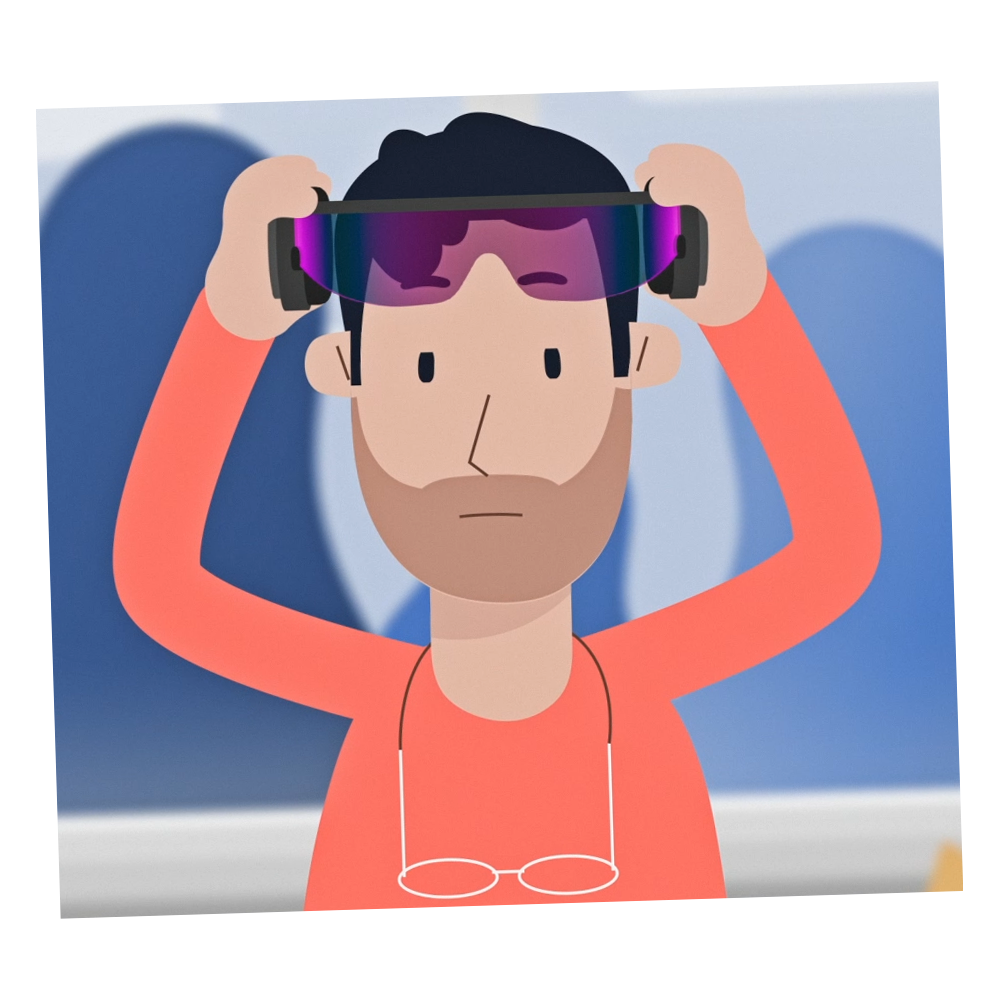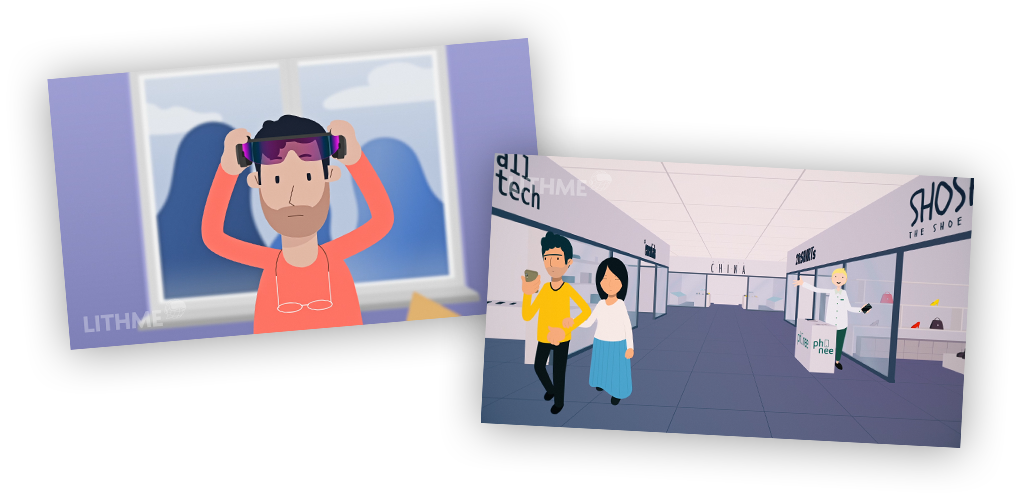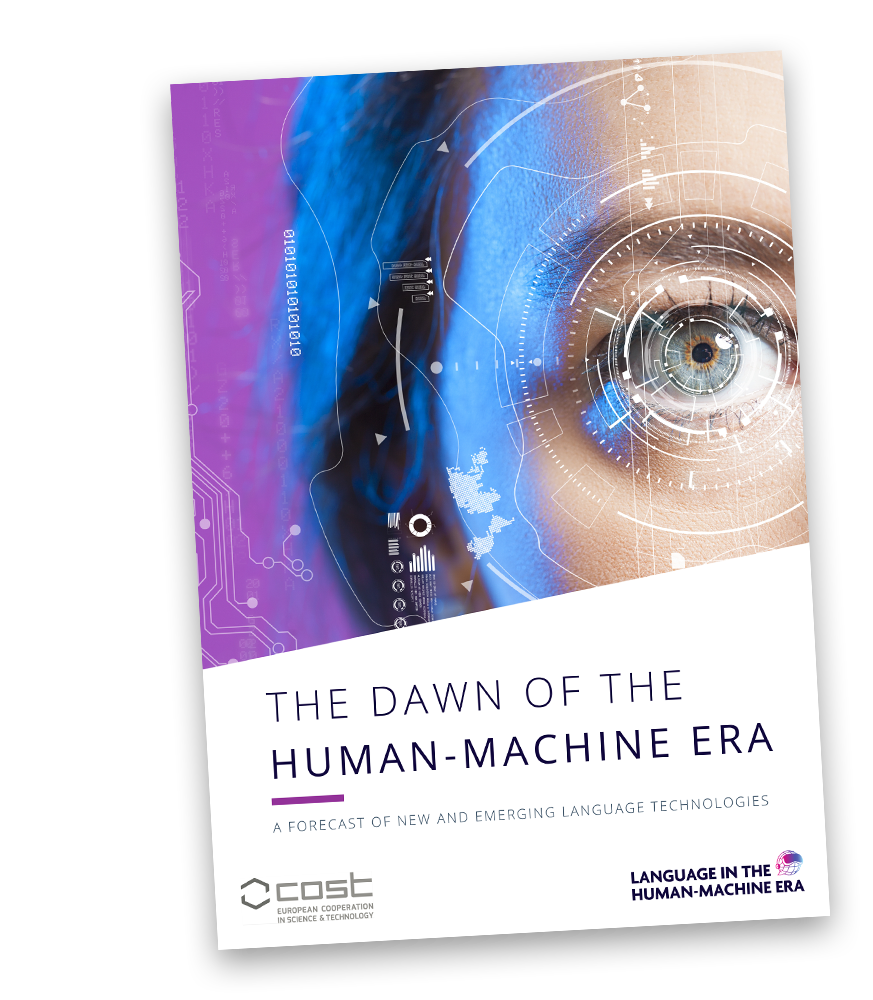
Publications
The ‘human-machine era’ is coming soon: a time when technology is integrated with our senses, not confined to mobile devices. It means that the hardware will move from our hands into our eyes and ears. Intelligent eyewear and earwear will be able to translate another person’s words, and make it look and sound like they were talking to you in your language. But not only will technology mediate what we see, hear and say in real time – it will be having increasingly complex conversations with us.


Together with professional animators, LITHME has produced a series of videos that illustrate how new technologies – including augmented and virtual reality, and brain-machine interfaces – can soon reshape the way we use language. In addition, an international online survey has been launched to gather insights from the viewers.

Members from each LITHME working group have contributed to the forecast report titled ‘Dawn of the Human-Machine Era’. The report describes the current state and probable future trajectories of various language technologies – for written, spoken, haptic and signed modalities of language.
Documentary about LITHME produced by UNED and broadcasted in the Spanish national TV on December 2021.
Action chair Dave Sayers shares what LITHME is about in this video produced by the Grant Holder Institute University of Jyväskylä.

Training school teaching materials
LITHME Training School is an opportunity for participants to discuss and explore new areas from different research and professional interests. Working Group chairs and co-chairs lead the discussions and workshops.

Conference Book of abstracts
3rd International Conference on ‘Language in the Human-Machine Era’ took place on 15-16 May 2023 at the University of Groningen. Book of abstracts has been published and presentation recordings are available for LITHME members.
LITHME publications
LITHME Working group chairs and active members have acknowledged LITHME in these publications:
- 2024
- Dippold, D. (2024). Making the Case for Audience Design in Conversational AI: Users’ Pragmatic Strategies and Rapport Expectations in Interaction with a Task-Oriented Chatbot. Applied Linguistics, https://doi.org/10.1093/applin/amae033
- Ruiz Rosendo, L., & Amos, R. (forthcoming). Historical developments and perspectives. In Korybski, T., Davitti, E., & Braun, S., The Routledge Handbook of Interpreting and Technology. London: Routledge.
- Soltan, A. (2024). Alteritatea și achiziția adaptativă a limbajului în epoca dezvoltării exponențiale a tehnologiilor. In Sanda-Maria ARDELEANU, Mircea A. DIACONU, Dorel FÎNARU, Daniela HĂISAN (Eds) Limbaje și Comunicare. Vol XVII. Timp și Limbaj. CISL ed. a XVV-a. Editura Universităţii „Ştefan cel Mare”. Suceava. (p. 485-494). https://www.academia.edu/121135508/
- 2023
- Dippold, D. (2023). “Can I have the scan on Tuesday?” User repair in interaction with a task-oriented chatbot and the question of communication skills for AI. Journal of pragmatics, 204, 21-32. https://doi.org/10.1016/j.pragma.2022.12.004
- Shaikh, S., Yayilgan, S. Y., Klimova, B., & Pikhart, M. (2023). Assessing the Usability of ChatGPT for Formal English Language Learning. European Journal of Investigation in Health, Psychology and Education, 13(9), 1937-1960.
https://doi.org/10.3390/ejihpe13090140 - Pareja-Lora, A. (2023). Las industrias de la lengua en la sociedad digital. Lemma: Revista de Comunicación, 1(1).
https://doi.org/10.20511/lem.2023.v1n1.1862 - Himoro, M. Y., & Pareja-Lora, A. (2023). Construcción de un corpus escrito y una ontología de errores ortográficos del chabacano zamboangueño. Revista Española de Lingüística Aplicada/Spanish Journal of Applied Linguistics, 36(1), 234-269. https://doi.org/10.1075/resla.20052.him
- Klimova, B., Pikhart, M., Benites, A. D., Lehr, C., & Sanchez-Stockhammer, C. (2023). Neural machine translation in foreign language teaching and learning: a systematic review. Education and Information Technologies, 28(1), 663-682. https://doi.org/10.1007/s10639-022-11194-2
- Klimova, B., Pikhart, M., Fronckova, K., Sanchez-Stockhammer, C., Stukalina, Y., Iruskieta, M., Dağdeler, K.O., Lejot, E., Parmaxi, A., Bartolomé Rodríguez, R., & Pareja-Lora, A. (2023). Analysis of foreign language teachers’ attitudes towards digital teaching in the European Union countries. Sustainable Multilingualism, 23, 195-227.
- Pikhart, M., Klimova, B., Meunier, F., Ibarra, I., Suñer Muñoz, F., Zamborova, K., Soulé, M. V., Bartolomé Rodríguez, R., & Parmaxi, A. (2023). Una revisión sistemática del impacto cognitivo de las modalidades de medios digitales en la comprensión lectora en L2. Investigaciones Sobre Lectura, 18(2), 56–87. https://doi.org/10.24310/isl.2.18.2023.16655
- Soltan, A. (2023) Policy and Dimensions of Alterity in Speech Communities of the Republic of Moldova after 1991. Thesis Summary. https://anacec.md/files/Soltan-Angela-abstract.pdf
- 2022
- Schneider, B. (2022). Multilingualism and AI: The Regimentation of Language in the Age of Digital Capitalism. Signs and Society, 10(3), 362-387. https://doi.org/10.1086/721757
- Seresi, M. & Koponen, M. &Pareja, A. & Bowker, L. & Delorme Benites, A.& Şahin, M. et al. (2022). LITHME WG7’s Survey on Machine Translation Use Habits and Practices. figshare. Dataset. https://doi.org/10.6084/m9.figshare.21165775.v1
- Zdravkova, K., Krasniqi, V., Dalipi, F., & Ferati, M. (2022). Cutting-edge communication and learning assistive technologies for disabled children: An artificial intelligence perspective. Frontiers in Artificial Intelligence, 5, 970430., https://doi.org/10.3389/frai.2022.970430
- Zdravkova, K., Dalipi, F., & Krasniqi, V. (2022). Remote education trajectories for learners with special needs during the COVID-19 outbreak: An accessibility analysis of the learning platforms. International Journal of Emerging Technologies in Learning (iJET), 17(21), 89-122., https://doi.org/10.3991/ijet.v17i21.32401
- Omazić, M, & Pavlović, N. (2022). Prevođenje u digitalnom okruženju: utjecaj prijevodnih tehnologija na praksu i teoriju prevođenja. In M. Glušac & A. Mikić Čolić (Eds.). Jezik u digitalnom okruženju (pp. 11-26). Zagreb: HDPL.
- Schneider, B. (2022). Multilingualism and AI: The Regimentation of Language in the Age of Digital Capitalism. Signs and Society, 10(3), 362-387.https://doi.org/10.1086/721757
- Soltan, A., Zbanț, L. (2022). Dimensiuni ale alterității lingvistice în procesul achiziției lingvistice. Colocviul “Traducerea – act creativ: între știință și artă” 1, Chişinău, Moldova. https://doi.org/10.5281/zenodo.6517577
- Soltan, A., Zbanț, L. (2022). Rolul de coach al profesorului în acomodarea alterității în procesul achiziției lingvistice. Studia Universitatis Moldaviae Seria Ştiinţe Umanistice, 154:4 (p. 34-39). ISSN 1811-2668 / ISSNe 2345-1009. https://doi.org/10.5281/zenodo.6583900
- Klimova, B., Pikhart, M., Benites, A. D., Lehr, C., & Sanchez-Stockhammer, C. (2023). Neural machine translation in foreign language teaching and learning: a systematic review. Education and Information Technologies, 28(1), 663-682. https://doi.org/10.1007/s10639-022-11194-2
- Himoro, M. Y., & Pareja-Lora, A. (2022). Codificación y anotación preliminar de un corpus oral multilingüe de conversaciones telefónicas interpretadas para el estudio de los ataques a la imagen. Pragmalingüística, (30), 413–432. https://doi.org/10.25267/Pragmalinguistica.2022.i30.19
- Himoro, M. Y.; & Pareja-Lora, A. (2022). Zamboanga Chavacano: A Survey on Written Practices, Reactions and Impact of its (Standardised) Orthography. Círculo de Lingüística Aplicada a la Comunicación 91, 245-277. https://dx.doi.org/10.5209/clac.7183
- 2021
- Zdravkova, K., & Krasniqi, V. (2021, September). Inclusive higher education during the Covid-19 pandemic. In 2021 44th International Convention on Information, Communication and Electronic Technology (MIPRO) (pp. 833-836). IEEE., https://doi.org/10.23919/MIPRO52101.2021.9596862
- Zdravkova, K., & Joksimoski, B. (2021). Educational Software for Speech Unintelligible Children with Down Syndrome. In Moving technology ethics at the forefront of society, organisations and governments (pp. 11-15). Universidad de La Rioja.
- Dippold, D., Erdocia, I., Fester-Seeger, T., Höhn, S., Kazazi, L., Lau, M., … & Viidalepp, A. Changing Language Ideological Concepts in the Human-Machine Era. Questions, Themes and Topics. https://www.researchgate.net/profile/Britta-Schneider/publication/365838026_Changing_Language_Ideological_Concepts_in_the_Human-Machine_Era_Questions_Themes_and_Topics/links/63860e357b0e356feb974905/Changing-Language-Ideological-Concepts-in-the-Human-Machine-Era-Questions-Themes-and-Topics.pdf
- Asztalos, Z., Balogh, D., Balogh, H., Eszenyi, R., Láncos, P., & Ugrin, Z. (2021). Számítógéppel támogatott jogi szakfordítás a gyakorlatban. Beszámoló a PPKE JÁK Jog és Nyelv Kutatócsoportja és a LITHME 2. munkacsoportja konferenciájáról. Modern Nyelvoktatás, 27(3-4), 140-145.
- Láncos, P. L. (2021). The Role of Language Technologies in Promoting the Participation of Linguistic Minorities in Social, Political and Economic Life. FOREIGN POLICY REVIEW, (2), 73-87. https://doi.org/10.47706/KKIFPR.2021.2.73-87
- Himoro, M. Y., & Pareja-Lora, A. (2021). Construcción de un corrector ortográfico híbrido para el chabacano de Zamboanga. E-Aesla, 7, 101-123. https://cvc.cervantes.es/lengua/eaesla/pdf/07/07.pdf
- 2020
- Zdravkova, K. (2020). Educational Games for Children with Down Syndrome. In Societal Challenges in the Smart Society (pp. 109-118). Universidad de La Rioja.
- Soltan, A. (2020). Rolul atitudinilor și reprezentărilor lingvistice în elaborarea politicilor lingvistice educaționale. Intertext. (B+) (pp. 177-191) Chișinău. ISSN 1857-3711. https://ibn.idsi.md/ro/vizualizare_articol/115490
